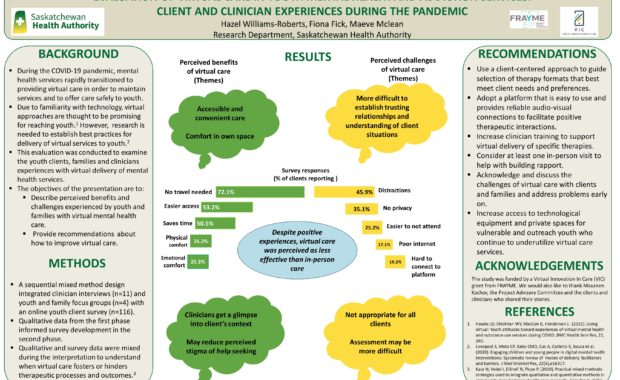Financial Toxicity is an increasingly utilized term that refers to both subjective and objective experiences of financial strain on patients as a
K03 – Going Beyond Patient- and Family-Centered Dementia Care: The Need to Explore the Multisystemic Family Terrain
Because individuals with dementia become increasingly dependent upon others as their illness progresses, dementia care requires the involvement and
I01 – Strengthening Interdisciplinary Collaboration in Family-Centered Primary Care: The Role of the Behavioral Health Consultant
Background: Family-centered primary care requires interdisciplinary teamwork to effectively respond to patients and families complex needs.
G01 – COVID 19 An Evolving New Normal: Fostering Relational Resilience at the Frontlines Part B: Healthcare Providers at the Frontlines
During the COVID 19 pandemic, there has been an unforeseen tension in the beliefs around the legitimacy of the virus and its mitigation and treatment
F01 – COVID-19 an Evolving New Normal: Fostering Relational Resilience at the Frontlines Part A: Families on the Frontlines
As COVID-19 is entering an endemic chronic phase, we are facing growing poor mental health and emerging prolonged health issues across the lifespan.
C03 – Family-Centered Care of Older Adults with Dementia and Family Caregivers: Evidence and Opportunities for Behavioral Health Intervention
Although family-centered care has been emphasized in behavioral health (BH) practice, few family-based interventions and care models have been
Poster 50 – Evaluation of Virtual Care in Youth Mental Health and Addiction Services: Client and Clinician Experiences During the Pandemic
The COVID-19 pandemic resulted in a rapid transition to virtual care delivery. Virtual care approaches are thought to be promising techniques for
F02 – COVID-19 Pandemic: A Multisystemic Approach to Address Family and Healthcare Provider Challenges
The COVID-19 pandemic has proven to have pervasive impacts on all aspects of family life. Some of these impacts are drastically increasing as reports
K02 – PMADS in Primary Care
The perinatal period, during pregnancy and 12 months postpartum, is crucial to the health and wellbeing of women. All aspects of a woman's life,
J02 – Family Centered Substance Use Disorder Treatment: How to Integrate a Family Systems Lens into a Medication Assisted Treatment Program
The aim of this presentation is to provide a basis for conceptualizing substance abuse through a family systems lens and explore treatment options
D02 – Family-Centered Primary Care as an Opportunity to Promote Equitable Health Care Among Older Adults with Cognitive Impairment
Cognitive impairment (e.g., dementia) in older adults can be a difficult condition for patients, families, and their medical providers to address. The
B03 – How are the Children and Families Doing? – A Systemic Approach to Recognizing and Responding to ACES in Early Childhood.
A focus on ACES in healthcare requires a multi-faceted approach that includes: awareness and education, training, screening, support, treatment, and
C02 – Family Support and Self-Management Behaviors in Underserved Latinx Patients with Diabetes
There are few areas where health disparities are more pronounced than the uniquely burdensome impact of diabetes on Latinx families. Though greater
D06 – Tapping Into Values in Shared Decision-Making
Managing emotions at decision points in care is a challenge in the time-limited environment of providing patient care. This is exacerbated for
A03 – Strategies to Enhance Adolescent Engagement in Primary Care Behavioral Health Discussions
Research indicates that adolescents tend to have the lowest rate of primary care service utilization compared to younger children (AAP, 2008).
E02 – Bringing Families & Context to Primary Care
Background: Family-centered care maintains mutually beneficial partnerships between healthcare providers, patients, and patients' families in

